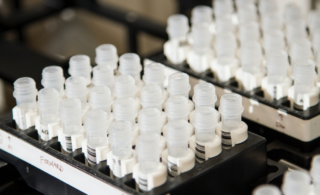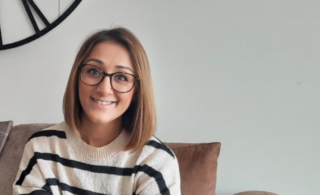
Let's Nail Breast Cancer - Help support our urgent appeal on the 19th - 20th May 2024
Let's Nail Breast Cancer - Help support our urgent appeal on the 19th - 20th May 2024
Let's Nail Breast Cancer - Help support our urgent appeal on the 19th - 20th May 2024
Let's Nail Breast Cancer - Help support our urgent appeal on the 19th - 20th May 2024
Let's Nail Breast Cancer - Help support our urgent appeal on the 19th - 20th May 2024
The use of writing and journaling is known to help process trauma and this article explores how writing helped the author deal with her diagnosis as she went through – and beyond – treatment.
By Katie
One and a half years of breast cancer treatments have left me feeling like a broken house. Chemotherapy. Three surgeries. Radiotherapy. Hormone therapy. I am all smashed windows; a trail of litter and destruction running up to my door. Maybe like a house that looks like you have been burgled but actually it was just your toddlers. Metaphorical littered tea-plates and bits of blackberry jam smudged on the table top, old bottles of half-drunk red wine and dirty tea towels. You get the picture.
FEELING OUT OF PLACE, EXHAUSTED AND EMOTIONAL
It’s not how I imagined my recovery. Although I was warned, I didn’t think I would feel so out of place. So exhausted. So emotional. Seven months post – active treatment and I am in a place I can only describe as a Wasteland. It’s all new – my body needs so much time to rest. I have to prioritise my mental health. I have not returned to normal.
I keep throwing away all my old clothes – anything that reminds of my pre-cancer self and myself in treatment. Especially the clothes I was wearing just before the diagnosis in the winter of 2019. Our clothes hold our stories. And when I open my soft-green wooden drawers and hear the confusion and pain, I know I will never put them back on my new body. They smell of betrayal to me. I can barely bring myself to pick them up and touch them, they stare at me in my tumbled drawers and ask: how did you not know you had a 7cm tumour in your right breast?
A SEA OF IMAGES: FEAR AND ISOLATION OF SURGERY DURING COVID
The ‘good news’ jumpsuit’ I celebrated the unexpected news that the 9cm tumor on my adrenal gland was benign? Gone. I can’t imagine putting my legs into it’s happy turquoise without drowning in the sea of images that are lodged, the fear and isolation of the surgery at the height of Covid. So they go to the charity shop – the Cancer Research one, naturally. And I tell myself I’m shedding skin, that it’s a natural thing to do, to get rid of everything you used to be.
Bags and bags leave the house, looking for new owners. My eyelashes are back and my hair grows. Curly now too, which is a treat. I have no idea who I am now.
I START WRITING TO PROCESS THE SHOCK OF IT ALL
I started writing as soon as I started chemotherapy. I had to, to process the shock of it all. I resisted at first because I was supposed to be writing a PhD, not a journal about breast cancer. But write I did. Firstly, to stave off the dreaded chemo-brain (some days, even writing a tiny poem was hard, but there was such comfort in completing something – no matter how small).
In the lonely recovery room after my adrenalectomy last May – my first of three surgeries during Covid – I grabbed my phone and with eyes that could barely see and a body that could not sit up yet, I signed up for Wildfire magazine’s weekly writing workshops. I had come across the American magazine for young women affected by breast cancer on Instagram and was drawn to their Personal Narrative workshops led by the Editor and founder, April Stearns. I just knew I needed to deep dive into writing. And I haven’t looked back. Only inside.
WRITING CREATES A SPACE FOR ME TO SLOW DOWN
I found that writing created a space for me to really slow down and process on a deep level everything I had been through. My words retraced the traumatic path; each word, image, phrase became a stepping stone or a bridge – and magically I found – I still find that writing about my experience opens up a direct channel between me and what I call my tender voice.
WRITING OUT THE PAIN AND HURT IS THERAPUETIC
Writing out all the pain and hurt became so therapeutic, I was able to start seeing myself how others might. Writing about myself helped me be gentle with myself, helped me tap into what I really needed in this confusing and lonely wasteland that is post-treatment. Instead of putting pressure on myself or feeling frustrated that I couldn’t do all the things before and basically needed a lie down before simply making the dinner, writing helped me listen to my body and I started hearing a tender voice. A warm voice, like an arm around my shoulders, she whispers, ‘you are doing so well, look how far you have come. I’m proud of you. Gently does it.’
I may not recognise myself. I may not know who I am. I may be reluctant to fit back into the shape I left. But I do know how I want to feel. It comes quietly and invisibly, like seeds caught on the breeze. I am starting to really acknowledge the fact that ‘I am’ is a complete sentence. My to-do lists have become to-feel lists. I know I would rather watch my plants grow than track the changes in my face. I used to look for lines and wrinkles, signs of getting older, grey hairs would horrify me. Really they did. That all seems absurd now to me.
WRITING HELPS ME UNDERSTAND HOW I REALLY FEEL
Writing is a profound component of my messy, quiet, silent, disruptive non-linear healing. I have seen that actually I don’t really know how I feel about something until I write it. Writing has helped me dig under the surface of my story. Helped me see beauty through the trauma. And helped me lay some serious negative spiralling thoughts to rest. I’ll leave you with the words of April Stearns, Editor and founder of Wildfire magazine:
“Writing our stories gives us the opportunity to shift our perspective, to become an observer, the narrator, versus the victim. The shift is small and yet it is everything in regaining a bit of control in an out of control situation. I believe it can be the difference between a difficult cancer experience being simply traumatic and taking a traumatic experience to a place of empowerment. It begins with the pen and looking bravely within.”
About Katie: Katie is a literacy consultant, writer, teacher and mother of four. After her primary breast cancer diagnosis in November 2019, Katie fell in love with writing, and has written her way through the messy, non-linear healing. She writes fiction and non-fiction.
To return to the homepage of our Information Hub, click here where you can access more helpful information, practical advice, personal stories and more.
Future Dreams hold a range of support groups, classes, workshops and events to help you and your carers during your breast cancer diagnosis. These are held both online and in person at the London-based Future Dreams House. To see what’s on offer and to book your place, see here.
July 2021 (Reviewed December 2023)
This article was written by a guest author based on their own experience of breast cancer and its treatment. It is important to note that this is one person’s experience and that whilst there may be commonalities between the experiences of different people, everyone has a different diagnosis/treatment plan/general experience. The information and content provided in all guest articles is intended for information and educational purposes only and is not intended to substitute for professional medical advice. It is important that all personalised care decisions should be made by your medical team. Please contact your medical team for advice on anything covered in this article and/or in relation to your personal situation. Please note that unless otherwise stated, Future Dreams has no affiliation to the guest author of this article and he/she/they have not been paid to write this article. There may be alternative options/products/information available which we encourage you to research when making decisions about treatment and support.
Share

Support awareness research
Donate to those touched by BREAST cancer
Sylvie and Danielle began Future Dreams with just £100 in 2008. They believed nobody should face breast cancer alone. Their legacy lives on in Future Dreams House. We couldn’t continue to fund support services for those touched by breast cancer, raise awareness of breast cancer and promote early diagnosis and advance research into secondary breast cancer without your help. Please consider partnering with us or making a donation.



